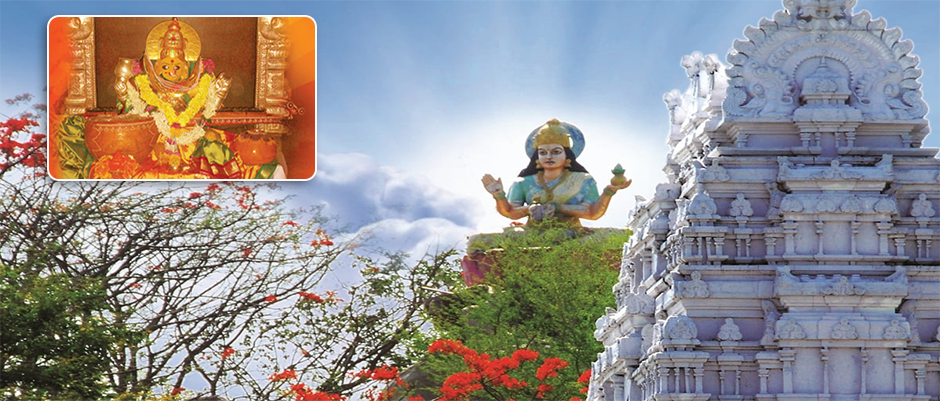
Sri Gnana Saraswathi Devastanam - Basara Temple
Sri Gnana Saraswati Temple, Basar – A Sacred Beginning to Knowledge
Amidst the calm surroundings of Basar village in Telangana, close to the gentle stream of the Godavari River, stands a revered temple dedicated to Goddess Saraswati. It is here that many believe the pursuit of knowledge truly begins, under the blessings of the goddess of wisdom. This temple is one of the very few in India dedicated to Goddess Saraswati, the embodiment of knowledge, music, and spiritual awakening.
A Legend Rooted in Devotion
It is believed that after the great war of the Mahabharata, Sage Veda Vyasa wandered in search of peace. His spiritual journey brought him to the calm and serene Kumarachala hills, now known as Basar. There, he meditated intensely on the Divine Mother, seeking clarity for the world.
In response to his devotion, the Goddess appeared before him in the divine forms of Saraswati, Lakshmi, and Kali—the three manifestations of feminine energy. She instructed the sage to place three handfuls of sand at specific spots each day. Miraculously, over time, these sand mounds transformed into idols of the goddesses, which still grace the temple today.
Tri-Shakti in One Temple
Though the temple is primarily known for its dedication to Goddess Saraswati, it is equally a Tri-Shakti Peetham, where Mahakali, Mahalakshmi, and Maha Saraswati are all venerated. This makes Basar a spiritually powerful location for devotees seeking strength, prosperity, and wisdom in one sacred space.
Aksharabhyasa – The Sacred Start of Learning
One of the most cherished ceremonies held at this temple is Aksharabhyasa, also known as Vidya Arambham, marking the auspicious start of a child’s learning path. Parents bring their young children here to begin their educational journey with the blessings of the Goddess. In a hall within the temple, priests guide the children to write their first letters, often on rice or a slate.
This moment is deeply emotional for families—symbolizing not just the start of schooling, but the invocation of Saraswati's grace for lifelong wisdom, clarity, and success.
The Everlasting Flame – Akhanda Deepam
Inside the temple complex, an Akhanda Deepam (eternal flame) burns without interruption, signifying the light of divine knowledge that never fades. Devotees pour oil into the lamp as a personal offering, praying for inner clarity and academic success for their loved ones. Oil for this purpose is available within the temple premises.
Spiritual Sites Around the Temple
Basar is surrounded by many spiritual spots that amplify its divine aura:
Sri Dattatreya Temple: A shrine dedicated to the three-faced incarnation of the Divine Trinity, located close to the main temple.
Sri Mahakali Temple: A place of devotion for those seeking protection and strength.
Lord Shiva Temple: Located near the riverbank, where many devotees perform prayers and rituals, especially on Mahashivaratri.
The Cave of Narahari Maluka
A short walk from the main shrine brings you to a quiet cave, believed to have been the place of penance for the saint Narahari Maluka. Known for his intense devotion and inner discipline, Narahari Maluka’s presence continues to be felt here. The air is still, the atmosphere meditative, and pilgrims often pause here in silence, absorbing the divine vibrations left behind by his spiritual practices.
The Eight Sacred Pushkarnis (Teerthams)
Scattered around the village of Basar are eight holy water tanks, each carrying its own sacred significance. These Pushkarnis are:
Indra Teertham, Surya Teertham, Vyasa Teertham, Valmiki Teertham, Vishnu Teertham, Ganesha Teertham, Putra Teertham, and Shiva Teertham.
Devotees believe that bathing in these waters, especially during festivals, helps purify the soul and fulfill heartfelt prayers.
The Sacred Flow of Godavari
The majestic River Godavari flows just a kilometer from the temple. On festival days, the riverbank becomes a site for ritual baths, community gatherings, and offerings. Many pilgrims begin their day by bathing in the river before heading to the temple for darshan.
Festivals That Illuminate the Temple
The temple is especially vibrant during major festivals:
Vasantha Panchami: Celebrated in honor of Saraswati, marking the onset of spring.
Navratri/Dussehra: Nine nights of worshipping the Divine Feminine in all her forms.
Mahashivaratri: A night of fasting and prayer dedicated to Lord Shiva.
During these occasions, the temple is filled with lamps, devotional songs, cultural performances, and the joyful presence of thousands of devotees.
Rebuilding and Legacy
Though the origins of the temple date back thousands of years, it was rebuilt around 200 years ago by Makkaji Patel, a devout individual who, along with his supporters, restored the temple after a period of neglect and desecration. His efforts ensured that the flame of devotion continued to burn for future generations.
How to Reach Basar
From Hyderabad: 240 km by road, 190 km by rail
From Nizamabad: ~30 km
From Nanded: ~100 km by road / ~90 km by rail
The scenic journey through Telangana’s countryside adds to the pilgrimage experience.
Conclusion: A Temple That Inspires Inner Light
Sri Gnana Saraswati Temple at Basar is more than a place of worship—it is a sanctuary where thousands come to begin their life’s learning with the touch of the divine. Whether it's a child writing their first alphabet, a seeker meditating by the cave, or a family offering prayers by the river—each moment at Basar feels deeply sacred. In this timeless temple, knowledge is not just taught—it is awakened.
Basara Saraswati Temple Timings
4:00 AM – Temple Opens
4:00 AM to 4:30 AM – Temple Pooja, Issuance of Abhishekham Tickets
4:30 AM to 7:30 AM – Abhishekam, Alankarana, Harathi, Prasadam
7:30 AM to 12:00 Noon – Archana and Sarva Darshan and other poojas
12:00 to 12:30 PM – Nivedana - Harathi
1:00 PM to 2:00 PM – Closed (Dwarabandhanam)
2:00 PM to 6:00 PM – Archana and Sarva Darshan and other poojas
6:30 PM to 7:00 PM – Devasthanam Pradosha Pooja
7:00 PM to 8:30 PM – Maha Harathi, Darshanam and Prasadam
8:30 PM – Temple will be closed (Dwarabandhanam)
